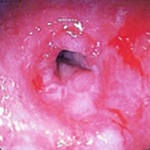Pages
Health Care News
Categories
- Asthma education
- Autism
- Canadian Health&Care Mall
- Cardiac function
- Critical Care Units
- Follicle
- Health
- health care medical transport
- health care programs
- Health&Care Professionals
- Hemoptysis
- Hormone
- Isoforms
- Nitroglycerin Patches
- Profile of interleukin-10
- Progesterone
- Pulmonary Function
- Sertoli Cells
- Theophylline
- Tracheoesophageal Fistula
Canadian HealthCare News
Peptic disease in elderly patients: PATHOPHYSIOLOGY Part 4
 Hypertonic saline application to the stomach was shown to induce more gastric damage in aging rats than in young rats. However, studies of acute ASA-induced gastric injury have found conflicting results in animals. Investigators using cold restraint-induced stress ulcerations also have reported variable results. Differing injurious agents may have variable effects in different strains of animals.
Because of these differences, it is pertinent to examine some of the individual steps that are associated with prevention of gastric ulceration or accompany effective healing of such ulcers once produced. Epithelial repair after superficial injury is called restitution, a process that takes place immediately after injury and involves cell migration over the injured area. Several peptides are involved, including epidermal growth factor, acidic and basic fibroblast growth factor, cytokines and trefoil peptides. No studies have specifically focused on this process in the gastric mucosa of aging animals.
(more…)
Hypertonic saline application to the stomach was shown to induce more gastric damage in aging rats than in young rats. However, studies of acute ASA-induced gastric injury have found conflicting results in animals. Investigators using cold restraint-induced stress ulcerations also have reported variable results. Differing injurious agents may have variable effects in different strains of animals.
Because of these differences, it is pertinent to examine some of the individual steps that are associated with prevention of gastric ulceration or accompany effective healing of such ulcers once produced. Epithelial repair after superficial injury is called restitution, a process that takes place immediately after injury and involves cell migration over the injured area. Several peptides are involved, including epidermal growth factor, acidic and basic fibroblast growth factor, cytokines and trefoil peptides. No studies have specifically focused on this process in the gastric mucosa of aging animals.
(more…)
Peptic disease in elderly patients: PATHOPHYSIOLOGY Part 3
 Cryer et al evaluated changes in prostaglandin (PG) concentrations in the gastroduodenal mucosa of animals and humans, as well as the PG responses of the mucosa to injury. These results have been confirmed by others. These studies have pointed to lower concentrations of PGE2 and PGFa in the fundus and antrum of the stomach as well as in the duodenum of elderly subjects (aged 56 to 81 years). Furthermore, studies of the effect of stimulants that injure the mucosa upon PG production also suggest that the response is impaired as a function of age. Recent findings that very small doses of acetylsalicylic acid (ASA) reduce PG concentrations of the stomach dramatically raise the question of whether some of the previous results of PG concentration may have been due to subjects taking intermittent salicylates. All of these data imply that these individuals have a relatively deficient defense mechanism associated with PG secretion.
(more…)
Cryer et al evaluated changes in prostaglandin (PG) concentrations in the gastroduodenal mucosa of animals and humans, as well as the PG responses of the mucosa to injury. These results have been confirmed by others. These studies have pointed to lower concentrations of PGE2 and PGFa in the fundus and antrum of the stomach as well as in the duodenum of elderly subjects (aged 56 to 81 years). Furthermore, studies of the effect of stimulants that injure the mucosa upon PG production also suggest that the response is impaired as a function of age. Recent findings that very small doses of acetylsalicylic acid (ASA) reduce PG concentrations of the stomach dramatically raise the question of whether some of the previous results of PG concentration may have been due to subjects taking intermittent salicylates. All of these data imply that these individuals have a relatively deficient defense mechanism associated with PG secretion.
(more…)
Peptic disease in elderly patients: PATHOPHYSIOLOGY Part 2
 Until recently, it was generally believed that gastric acid secretion declined with advancing age. For example, Baron described a decrease in basal secretion and peak acid output after histamine stimulation with increasing age. This study, however, used 30 years as the age to divide a small number of young and older subjects. More recent studies from the United States and elsewhere reported that basal and stimulated gastric hydrogen ion secretions did not fall if patients with atrophic gastritis and H pylori infection were excluded. Most of these studies did not include sufficient numbers of volunteers older than 65 years of age. A more comprehensive prospective study that included 22 subjects older than 65 years of age found no significant effect of age on gastric acid secretion after adjusting for the influence of atrophic gastritis and smoking. Serum gastrin levels were similar at all age groups but became elevated in the presence of atrophic gastritis. However, pepsin output was significantly depressed in older subjects in this study. A study in rats up to 24 months of age demonstrated a reduction in basal and gastrin-stimulated acid output, and lower serum and antral gastrin concentrations in older animals. A recent study in Sprague-Dawley rats between the ages of seven and 90 weeks suggested that gastrin receptor mRNA was markedly higher in 65- and 90-week-old rats than in younger animals. The causes and consequences of these changes are unclear.
(more…)
Until recently, it was generally believed that gastric acid secretion declined with advancing age. For example, Baron described a decrease in basal secretion and peak acid output after histamine stimulation with increasing age. This study, however, used 30 years as the age to divide a small number of young and older subjects. More recent studies from the United States and elsewhere reported that basal and stimulated gastric hydrogen ion secretions did not fall if patients with atrophic gastritis and H pylori infection were excluded. Most of these studies did not include sufficient numbers of volunteers older than 65 years of age. A more comprehensive prospective study that included 22 subjects older than 65 years of age found no significant effect of age on gastric acid secretion after adjusting for the influence of atrophic gastritis and smoking. Serum gastrin levels were similar at all age groups but became elevated in the presence of atrophic gastritis. However, pepsin output was significantly depressed in older subjects in this study. A study in rats up to 24 months of age demonstrated a reduction in basal and gastrin-stimulated acid output, and lower serum and antral gastrin concentrations in older animals. A recent study in Sprague-Dawley rats between the ages of seven and 90 weeks suggested that gastrin receptor mRNA was markedly higher in 65- and 90-week-old rats than in younger animals. The causes and consequences of these changes are unclear.
(more…)
Peptic disease in elderly patients: PATHOPHYSIOLOGY Part 1
 A wide range of physiological changes are thought to be associated with the process of aging, including changes in the organs of the gastrointestinal tract. In previous reviews, such effects as decreases in motility, and in gastric, pancreatic, biliary or intestinal secretions, and changes in absorptive capacity have been described. More careful analyses of the physiological effects of aging that excluded the influence of disease resulted in a major reconsideration of what can be attributed to physiological changes as a part of the process of aging.
Table 1 summarizes the major issues surrounding peptic diseases in elderly patients. The following are important: the role of Helicobacter pylori infection in altering the control of gastric acid secretion and in determining the incidence and course of peptic disease in older patients; crucial differences in the clinical picture of older patients with peptic disease; the issue of whether the evaluation and the diagnostic approaches that are usually used in younger patients should differ when considering peptic disease in elderly patients; and whether treatment options should be altered because a patient is over the age of 65 years (Table 2).
You can shop for the medicine you need for treating the condition mentioned above right here at the Canadian Health&Care Mall. This pharmacy offers a large selection of medications available over the internet at amazingly low prices.
(more…)
A wide range of physiological changes are thought to be associated with the process of aging, including changes in the organs of the gastrointestinal tract. In previous reviews, such effects as decreases in motility, and in gastric, pancreatic, biliary or intestinal secretions, and changes in absorptive capacity have been described. More careful analyses of the physiological effects of aging that excluded the influence of disease resulted in a major reconsideration of what can be attributed to physiological changes as a part of the process of aging.
Table 1 summarizes the major issues surrounding peptic diseases in elderly patients. The following are important: the role of Helicobacter pylori infection in altering the control of gastric acid secretion and in determining the incidence and course of peptic disease in older patients; crucial differences in the clinical picture of older patients with peptic disease; the issue of whether the evaluation and the diagnostic approaches that are usually used in younger patients should differ when considering peptic disease in elderly patients; and whether treatment options should be altered because a patient is over the age of 65 years (Table 2).
You can shop for the medicine you need for treating the condition mentioned above right here at the Canadian Health&Care Mall. This pharmacy offers a large selection of medications available over the internet at amazingly low prices.
(more…)
